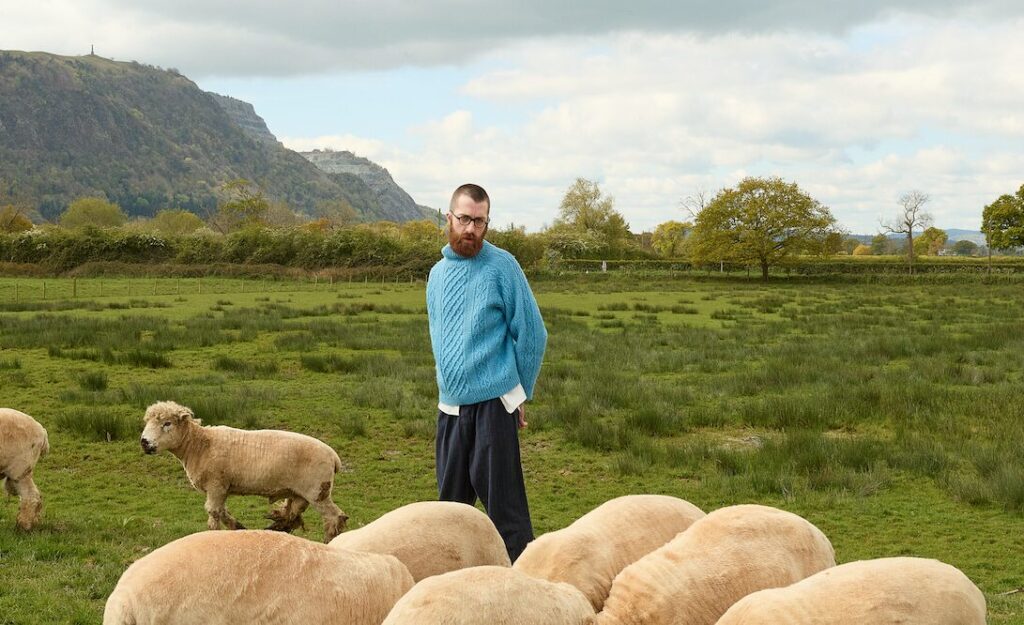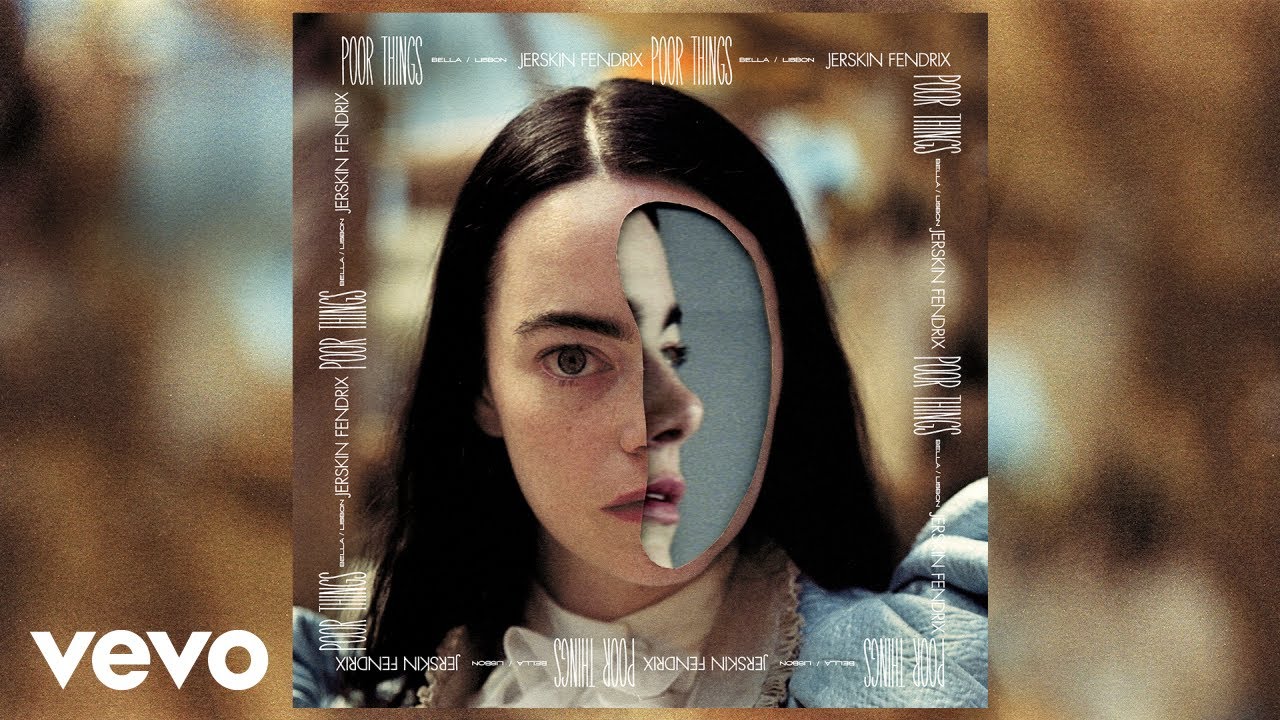Moderate Chaos: Jerskin Fendrix Interviewed
Jerskin's second album Once Upon a Time... In Shropshire is a novel album of country death songs, country life songs and country love songs. But why did it take so long and how does it fit in with his growing reputation as a composer for films? Words by Robert Davidson. All photography by Tim Gutt. CW: Contains mention of suicide
Five years ago everything was changing for Jerskin Fendrix. His debut album Winterreise had garnered acclaim from those paying attention. Its spatial and temporal criss-cross of lyrics and genre-hopping compositions told the story of his first serious break-up and created a well of gravity that pulled Instagram stories, a sincere supplication to morph into Ezra Koenig, and Franz Schubert’s 19th century song-cycle of the same name towards it. A carefully constructed maximalist pop, it gave those who engaged with it something meaningful and strange to truly engage with, during a universally fraught time.
I interviewed him at the time and he revealed that he was already in the process of writing his second album and that there were a few other ‘interesting things’ in the pipeline. What those ‘interesting things’ were and what this second album would become are both of interest to us today for different reasons. His just announced second album, Once Upon a Time… In Shropshire, is finally complete and primed for release on 10 October; but a larger number of people will be exposed to his work a couple of weeks later, when the film Bugonia, which he has scored, goes on general release.
He calls from a new flat in London, which he moved into last week. He admits he has been in a “kind of moderate chaos” as he balances all of this work with setting up a new home; a conversation which in turn leads on to Shropshire, where his family moved in 2001, when he was only six. The county, as the title suggests, is the main force of his second album.
Shropshire is a quiet, rural county in the West Midlands that borders Wales, and it holds a special place in Jerskin’s heart. “I wanted to write about Shropshire for a long time. And because I was living there from a very young age, I felt so strongly and so sensitively about just the place itself, the nature of it. The forests, the landscapes, the nature of light there, and the animals. But it was all a lot of artistic feeling that didn’t have much of a proper spine to align itself to”.

But then things changed in a most unwelcome way. During 2020 he received a phone call that kicked him in the gut. One of his childhood friends had committed suicide. In an attempt to process the events, he endeavoured to write a new album which would be dedicated to his friend. He says: “And then I realised that I wasn’t able to write about it divorced from the context of where we grew up and what the entire place was like.” He adds: “It evolved into things like wanting to write about my childhood and my friends and our adolescence and all these shared things. And I realised that nothing that I was trying to get across actually meant anything without the context [of Shropshire]”.
Jerskin said he did a lot of writing over the following year as lockdowns came and went. However, shortly after the release of Winterreise, he would receive a very different type of call. He remembered his manager imploring him to check his emails immediately. When he did, he saw there were somewhere in the region of ten missed emails titled: “Yorgos Lanthimos project”. The highly-regarded Greek filmmaker needed a composer to score the upcoming Poor Things, starring Emma Stone and Mark Ruffalo. The film is postmodern, lightly surreal, fantastical retelling of Mary Shelley’s Frankenstein based on Alasdair Gray’s 1992 book of the same name. Based on a few listens to Winterreise, Lanthimos had decided that Jerskin was the man. And just like that “within less than a year after the release of the record, I was working on Poor Things”. He would go on to get nominated for an Oscar for his Original Soundtrack, and has a ‘blink and you’ll miss it’ cameo as a restaurant manager in the film.
The upshot was that he had to take time away from writing his second album. “The scores for Poor Things and for [his second feature-film collaboration with Lanthimos] Kinds Of Kindness took up most of 2021 and 2022. In terms of the new album I think it was good for the writing process. I had really long periods where I had to forget about the record and work on this other [music] that was very different”. He reflects: “It gave me a lot of time to think and come up with a far more considered and wider perspective of the themes than if I’d just blasted through it”.
In 2022, however, he received more news which would change the direction of the album yet again. His father developed an aggressive form of motor neurone disease with little warning. Jerskin returned home to support his mother during his father’s final weeks: “My brothers and me are all very stoic kind of people; and we had a responsibility to our mum to make sure she was okay but – as you can imagine – that was pretty fucking intense.” The disease wrought its work quickly and his father passed away during May of that year.
His father’s death dramatically widened the scope of the album. There was a clash between the sense of place in Shropshire that Jerskin was writing about and the death of two people who had left an indelible mark on him; and from this dynamism would grow the power of an audacious and peculiarly life-affirming new record. Like Winterreise, Once Upon a Time… In Shropshire is densely plotted and fast paced, effectively taking in its writer’s life, the lives of his family and the life of their home county. Throughout the near hour-long record you feel the weight of everything, entirely in flux, never settled, except in fleeting glimpses of the absoluteness of death. And – specifically in how it considers universality, identity and locality – it draws one’s mind to Joyce’s Ulyssess in a surprisingly natural way.
He explains: “It kept morphing. The whole thing got more and more corrupted. It got more and more abstract, but also that there were so many lenses to consider what my life meant. What happens to the nostalgia I felt, what happens to the memory, what happens to the place itself.” The entire experience made him reassess the album’s newfound importance: “I don’t like being voyeuristic for the sake of it, but I think that a lot of things I was coming to terms with and a lot of the conclusions I was drawing felt like they were really worth exploring. Worth exploring and worth expressing.”
In order to convey the complexity and magnitude of the themes he was wrestling with, Jerskin approached songwriting in a very fluid and expansive manner across a swathe of tracks, which are written from numerous perspectives. The lyrics to ‘Mum & Dad’ take the form of a parental conversation and ‘Princess’ is from the POV of a female character; in fact all of his family and friends appear at the very end of the record as a collective. The technique, he says, is something he learnt while scoring.
“When I started [composing for] Poor Things, the whole point was furnishing the characters on screen. Not just the lead character but all of the people in the story who all have their own kind of different warped experiences and emotions. I had to keep checking myself when [I found myself asking] what emotion would I feel if I was falling in love with someone or being angry or being lost or upset?” He adds that he has come face to face with the same problem working on subsequent films: “It’s meant to be selfless. So I think when I came back to writing songs about Shropshire, it gave me a better perspective of how to be artistically empathetic and how to think from other people’s points of view.”
When asked if he ever considered dropping the ‘Jerskin Fendrix’ name for his scores and keeping the two musical identities separate, he admits that he had considered it once, before deciding to keep his artistic persona consistent across both pursuits.

“Poor Things felt musically like such a continuation and widening of my palette and of the stuff that I’d already done before. I think there are a lot of composing jobs in Hollywood where it’s commissioned work. It’s not really a representation of one’s artistry, and I really found, I was given so much freedom, so much creative license in Poor Things. It really was my artistry. It was the same with Kinds Of Kindness and the same with [Jerskin’s third feature-film collaboration with Lanthimos coming out later this year] Bugonia”.
To further cement the connection of the two sonic worlds, the first taste of Jerskin’s new album, a demo for the track ‘King Lear’, premiered during the closing credits of Kinds Of Kindness. Jerskin’s father was an English Literature professor and he has spoken before of the importance of literature and religion in his upbringing, in particular being surrounded by great authors, with Shakespeare being a near-constant presence. The track ‘King Lear’ takes on layers of resonance as a result – the dying king is surrounded by his three children as the end approaches. But literary techniques go deeper than this. In the novel symbolic universe created by the album, some dreamlike images appear repetitively, forming something of a Jerskin Fendrix major arcana: the universe, God, the forest, the parents, birds, drunkenness, and the princess.
There have been two lead singles from the album – ‘Jerskin Fendrix Freestyle’ & ‘SK1’ – and they might feel like a pop banger and an epic slice of post rock respectively. However, give the former another spin and hear him prophesise “a beautiful evening” where “I will lose everything” and then hear him declare he will “sleep in my friend’s blood”, not to mention his observation that there is a “black cloud in the universe” that portends “more bad news from Shropshire”. Regarding this dark augury he says: “I don’t want to affect anyone’s interpretations too much but that song is very dense and I think even if it’s a bit encoded, it’s very much lyrically an overture of basically everything I’m covering in the record.”
In the context of the record, these are the two hardest, most pop-adjacent tracks, but much like on Nick Cave & the Bad Seed’s Ghosteen, elsewhere this record is mostly awash with spectral presences that travel slowly and surely; and as a result, these tracks stretch out long, dark and deep. Sombre strings, naked piano, and creeping bass are the main vehicles of expression. In particular, the second half of the album has four tracks in a row that are roughly seven minutes or longer, with a nearly nine-minute track closing out the record. It is likely that for those who hear the next single, ‘Beth’s Farm’ that the solemnity of the project will kick in. A halcyon and earnest remembrance of times past, it’s the album’s opener and concerns the purity that is corrupted across the following eight songs.
Jerskin is up-front about the goal of the record: “It’s absolutely for me and for my friends. It’s not built to be commercial.” Despite this, he hopes it is transcendent and – no pressure – can re-engineer the representation of death in art. For this record takes the maxim spoken at the very end of the Shakespeare play, when Lear’s son-in-law the Duke of Albany, having witnessed the passing of the King, says: “The weight of this sad time we must obey; speak what we feel, not what we ought to say”.
And this album says a lot about death, some of it raw and tragic – but a lot of it also irreverent: “I think death is approached bizarrely in a very one-dimensional way by a lot of art forms and that contributes to people feeling really guilty about it.” He continues: “I mean, death is basically the same thing as life. It’s equally variegated. It’s equally vibrant and dynamic and complicated.”
One of the most affecting and simultaneously ridiculous set of lyrics in the entire album comes in ‘Together Again’. After a heartbreaking observation, “Daddy’s in the kitchen and I’m worried about his brain”, he launches into a quasi-philosophical freestyle: “Everybody Lives / Everybody dies / Everybody dies eventually / Your bones are a loan from the earth and the sea / Death song, death song, 1, 2, 3”. It reads more like a Thomas Pynchon limerick than Ernest Hemingway eulogy, but it still hits like the latter. The song closes out imploringly: “Fear no more the heat of the sun”. It is the same lyric that open the album on ‘Beth’s Farm’. Like a few other instances in the album, it sounds like Jerskin is crying while he sings it.

A big distinction when comparing the run up to the release of his new album to Winterreise is that people aren’t locked-down now; he facetiously says he will undoubtedly be “forced” to perform his new album. With only one live performance in the last five years, and all that has happened since, I ask whether new shows will be like his pre-Winterreise shows where he was alone on the stage with laptop and microphone: “There won’t be many concerts, but they’re going to be very carefully considered and I’ve been thinking a lot about how I want to perform this record and I think they’re going to be very special. I hope.”
But the music scene he is returning to has changed so dramatically over those five years. Most of the bands he came up with such as Famous (of which he is a former member), Black Country, New Road, and Black Midi have either changed personnel and musical style or disbanded entirely. He admits: “It is a bit surreal. I do feel like I’ve been really away for a while and, yeah, a lot of things are different now. That’s both my [music] and everyone else’s [music]. But I’m very excited to come back. It feels appropriate. It feels like the timing is right.”
He singles out the independent venues that have nurtured him in particular, including Cafe Oto, the Shacklewell Arms and most famously The Brixton Windmill. Alongside The King Charles Theatre, he sees these venues as precious cultural touchstones in the capital. “It would not be an understatement to say that without the Windmill in Brixton I wouldn’t be in the position I am today. And I am looking forward to hopefully, once I start playing live again, being able to return there.”
When talking about the existential threats these venues have from rising rents and a capital dead-set to eat-up all and every piece of land, he remarks: “I’m always reminded of when Winston Churchill was asked if they could decommission the V&A to turn it into a munitions factory or something like that during the war. And he said if we do that then what are we fighting for? There is this idea that the soul of London or the soul of England or the soul of the UK can simply revolve around how much money can come into and go out of these locations. But we are a very, very cultural nation and we’re blessed with a great cultural legacy and such a large number of extraordinarily talented cultural practitioners. The fact that many of those individuals and many of the institutions that support them are being slowly erased financially is… Well, give it a few decades and you will see how fucked it really makes us.”
With Once Upon a Time… In Shropshire and Bugonia, being released close to one another later in the year, I ask whether there will be any crossover of these two worlds – will we see Emma Stone with him at the Brixton Windmill, with Yorgos on the drums? He laughs: “I’m going to have to get back to you on that…” The implication being that we might have to wait slightly longer than five years to experience that unlikely turn of events.
Once Upon A Time… In Shropshire is released on 10 October via Untitled (Recs)













